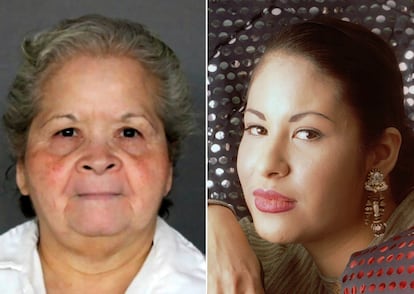The killer of Tejano music queen Selena Quintanilla is denied parole
Yolanda Saldívar shot the pop star in the back on March 31, 1995, when she was only 23 years old and on her way to becoming a legend. Texas prison authorities set the next parole review for March 2030


Texas prison authorities on Thursday denied parole to 64-year-old Yolanda Saldívar, the woman who shot Tejano music star Selena Quintanilla-Pérez in the back on March 31, 1995, in a motel in Corpus Christi, Texas. Saldívar received a life sentence, with the possibility of requesting a review of her case after 30 years. The denial of clemency came four days before the anniversary of an event that shocked Selena’s legion of fans and gave rise to a cult following unprecedented in Latin pop in the United States.
Saldívar had a close relationship with her victim, who was serving as president of her fan club. She also worked in the fashion boutiques that the singer opened in Corpus Christi, where she lived with her family until her death at age 23, and in San Antonio. At the trial, the killer claimed it was an accident, but the prosecution proved to the jury, who convicted Saldívar of first-degree murder, that the woman used a gun she had bought days earlier, returned, and then bought again when she was about to be fired. In the weeks leading up to the shooting, Selena’s father, Abraham Quintanilla, had accused Saldívar of embezzling money from his daughter’s business ventures.
The decision by the Texas Board of Pardons and Paroles means the inmate will not be able to request another review of her case for another five years. After a thorough consideration of all available information, the Board said, it has decided to deny Yolanda Saldívar’s parole and schedule her next review for March 2030. “The record indicates that the instant offense has elements of brutality, violence, assaultive behavior or conscious selection of victim’s vulnerability indicating a conscious disregard for the lives, safety, or property of others, such that the offender poses a continuing threat to public safety,” said the statement.
The Quintanilla family reacted with a statement in which they expressed gratitude at the Board’s decision. “Today, we are grateful that the Texas Board of Pardons and Paroles has chosen to deny parole for Yolanda Saldívar. While nothing can bring Selena back, this decision reaffirms that justice continues to stand for the beautiful life that was taken from us and from millions of fans around the world far too soon.”
The statement is also signed by Selena’s widower, Chris Pérez, who met his wife when he was a guitarist for Los Dinos, the band that she toured with in Texas and northern Mexico before becoming famous and racking up music awards as well as gold and platinum awards for record sales.
Last January, it emerged that Saldívar was planning to apply for parole, just months after a two-part true crime documentary unsuccessfully cast doubt on the motives surrounding the murder. Legal experts consulted by this newspaper recently agreed that it was unlikely she would be allowed to leave prison because, as San Antonio attorney Marshall Millard, a specialist in such requests, noted, “it’s rare in Texas for inmates to be granted parole on their first attempt.”
In recent days, the killer’s entourage told the tabloid The New York Post that it was the victim’s “aggression” that made Saldívar pull the trigger, marking a departure from the defense strategy and the narrative maintained for decades, according to which it was all due to an unfortunate accident during an argument between the two. This change was interpreted as a strategy to find new arguments for the review of the case.
The accident claim was challenged by the prosecution during the trial, held in Houston in late 1995, given that Saldívar grabbed the gun after shooting her victim and left the room toward her SUV, while Selena crawled to the motel lobby, where she collapsed. Doctors were unable to save her. Saldívar spent nine hours inside her vehicle threatening suicide, while a negotiator tried to calm her down.
Selena’s death and the ensuing trial became international news. By then, the artist had already achieved numerous milestones previously unseen for a Spanish-language performer in the United States and for a woman in the Tejano music genre, a traditionally male domain.
Her death at 23 made her even more famous and unleashed an avalanche of books, academic studies, television series and films, the first of which, Selena, came out as early as 1997. In it, a promising young actress named Jennifer Lopez played the fallen idol.
Sign up for our weekly newsletter to get more English-language news coverage from EL PAÍS USA Edition
Tu suscripción se está usando en otro dispositivo
¿Quieres añadir otro usuario a tu suscripción?
Si continúas leyendo en este dispositivo, no se podrá leer en el otro.
FlechaTu suscripción se está usando en otro dispositivo y solo puedes acceder a EL PAÍS desde un dispositivo a la vez.
Si quieres compartir tu cuenta, cambia tu suscripción a la modalidad Premium, así podrás añadir otro usuario. Cada uno accederá con su propia cuenta de email, lo que os permitirá personalizar vuestra experiencia en EL PAÍS.
¿Tienes una suscripción de empresa? Accede aquí para contratar más cuentas.
En el caso de no saber quién está usando tu cuenta, te recomendamos cambiar tu contraseña aquí.
Si decides continuar compartiendo tu cuenta, este mensaje se mostrará en tu dispositivo y en el de la otra persona que está usando tu cuenta de forma indefinida, afectando a tu experiencia de lectura. Puedes consultar aquí los términos y condiciones de la suscripción digital.








































